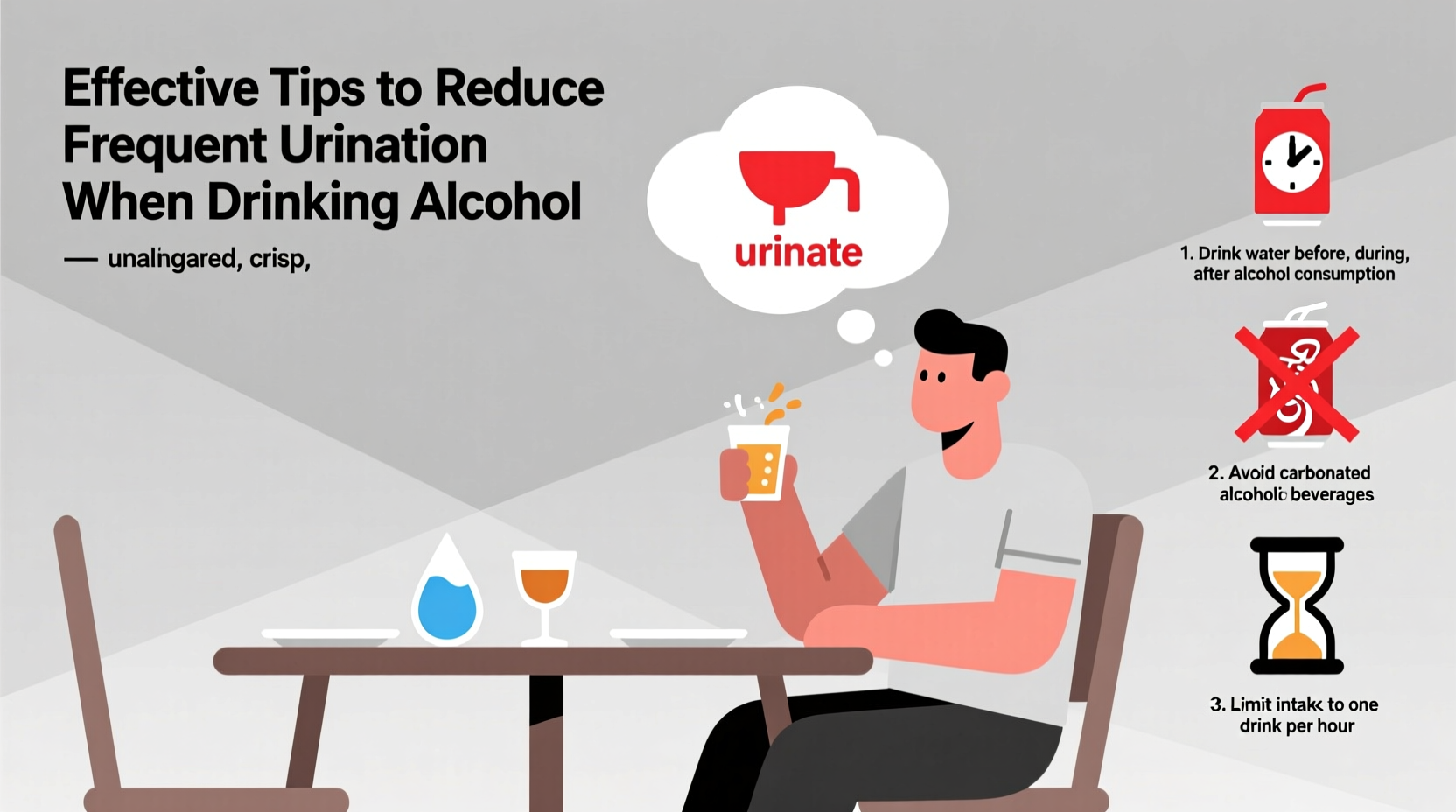Alcohol is a common part of social gatherings, celebrations, and relaxation rituals. However, many people notice they're making repeated trips to the bathroom after just a few drinks. This isn’t just inconvenient—it can disrupt sleep, affect hydration, and interfere with enjoyment. The reason? Alcohol is a potent diuretic, meaning it increases urine production by suppressing antidiuretic hormone (ADH), which normally helps your kidneys retain water. While you can't eliminate this effect entirely, there are practical, evidence-based strategies to minimize how often you need to urinate while drinking. These tips balance enjoyment with comfort, helping you stay hydrated, reduce urgency, and maintain control over your body’s response.
Why Alcohol Increases Urination

When you consume alcohol, it quickly enters your bloodstream and affects multiple systems, including your kidneys. The pituitary gland responds by reducing the release of vasopressin—also known as antidiuretic hormone (ADH). Without sufficient ADH, your kidneys don’t reabsorb as much water, leading to increased urine output. This process begins within 20 minutes of your first drink and continues as long as alcohol is in your system.
This diuretic effect is more pronounced with higher-alcohol beverages like spirits and less so with lower-alcohol options such as beer or wine—but all alcoholic drinks contribute to increased urination. Additionally, alcohol irritates the bladder lining in some individuals, exacerbating urgency and frequency even further.
“Alcohol’s suppression of ADH means your body loses more fluid than it retains, which explains both frequent urination and next-day dehydration.” — Dr. Lena Patel, Nephrologist and Fluid Balance Specialist
Strategic Drinking Habits to Reduce Bathroom Trips
How you drink matters as much as what you drink. By adjusting your pace and patterns, you can significantly reduce urinary frequency without giving up alcohol altogether.
- Alternate alcoholic and non-alcoholic drinks: For every alcoholic beverage, have a glass of water or sparkling mineral water. This slows alcohol absorption and keeps hydration levels stable.
- Sip slowly: Rapid consumption leads to faster ADH suppression and a sudden surge in urine production. Take at least 30–45 minutes per drink.
- Avoid carbonated mixers: Sodas and tonic water can increase bladder irritation and distension, triggering urgency. Opt for still water, juice (in moderation), or herbal infusions.
- Eat before and during drinking: Food slows alcohol absorption, moderating its diuretic impact. Focus on balanced meals with protein, healthy fats, and fiber.
Choosing the Right Drinks Matters
Not all alcoholic beverages affect urination equally. Understanding their differences allows you to make smarter choices.
| Drink Type | Diuretic Strength | Bladder Irritation Risk | Recommended Serving Size |
|---|---|---|---|
| Beer (5% ABV) | Moderate-High | Medium (carbonation + volume) | 1 bottle (12 oz) max per hour |
| Wine (12–14% ABV) | Moderate | Low-Medium (tannins may irritate) | 5 oz glass, limit to 2–3 |
| Spirits (40% ABV) | High | High (especially with sugary mixers) | 1.5 oz shot, max 2–3 with long intervals |
| Cider / Low-ABV Cocktails | Low-Moderate | Low | Up to 2 servings, spaced out |
Lower-alcohol options and non-carbonated preparations not only reduce urine output but also decrease the likelihood of nocturia—waking up at night to urinate—after evening consumption.
Step-by-Step Guide: How to Drink Smarter Tonight
If you’re heading out or hosting a gathering, follow this timeline to minimize bathroom visits while still enjoying yourself.
- 60 minutes before drinking: Eat a balanced meal with protein and complex carbs. Avoid salty foods that promote fluid retention.
- Start with water: Drink 16 oz of water before your first alcoholic beverage.
- First drink: Choose a low-to-moderate ABV option (e.g., wine spritzer or light beer).
- Between drinks: Wait at least 45 minutes and consume 8–12 oz of water or electrolyte drink.
- Last call cutoff: Stop drinking alcohol at least 2 hours before bed to allow your body time to process it.
- Before sleep: Drink a small amount of water (4–6 oz) if thirsty, but avoid excessive fluids to prevent nighttime urination.
Real-Life Example: Managing Nights Out Without Constant Bathroom Breaks
James, a 34-year-old marketing professional, used to dread nights out because he’d spend more time in the restroom than with friends. After learning about alcohol’s diuretic effects, he adjusted his habits. At his next event, he ate a salmon and quinoa bowl beforehand, alternated each cocktail with sparkling water, and limited himself to three drinks over four hours. He noticed he only needed to use the restroom twice during the evening—compared to five or six times previously. “I felt more present, less bloated, and didn’t wake up dehydrated,” he said. “It wasn’t about drinking less—it was about drinking smarter.”
Common Mistakes That Worsen Frequent Urination
Even with good intentions, certain behaviors amplify the problem. Avoid these pitfalls:
- Chugging drinks: Rapid intake overwhelms your liver and accelerates ADH suppression.
- Drinking on an empty stomach: Speeds up alcohol absorption and intensifies diuresis.
- Overhydrating right before bed: Can lead to nocturia despite reduced alcohol intake.
- Mixing alcohol with caffeine: Energy drinks or coffee-based cocktails double down on diuretic effects.
- Ignoring early signs of urgency: Waiting too long then going frequently suggests poor bladder regulation.
FAQ: Your Questions Answered
Does drinking more water counteract alcohol-induced urination?
Yes, but timing matters. Drinking water *between* alcoholic beverages helps maintain hydration and dilutes urine, reducing bladder irritation. However, chugging water right before bed won’t reverse prior fluid loss and may increase nighttime urination.
Can certain medications make alcohol-related urination worse?
Absolutely. Diuretic medications (like hydrochlorothiazide), antidepressants, and antihistamines can compound alcohol’s effects. Always consult your doctor if you're on medication and regularly consume alcohol.
Is frequent urination after drinking a sign of a bigger health issue?
Occasionally, yes. If you experience pain, urgency, or incontinence beyond typical diuresis, it could indicate an overactive bladder, UTI, or diabetes. Persistent symptoms warrant medical evaluation.
Final Checklist: Reduce Urination When Drinking Alcohol
- ✅ Eat a substantial meal before drinking
- Slows alcohol absorption and stabilizes fluid balance.
- ✅ Alternate each drink with water
- Maintains hydration and reduces total alcohol intake.
- ✅ Choose lower-alcohol, non-carbonated options
- Less strain on kidneys and bladder.
- ✅ Limit drinks to one per 45–60 minutes
- Gives your body time to metabolize alcohol gradually.
- ✅ Stop drinking 2+ hours before bedtime
- Reduces nighttime urination and improves sleep quality.
- ✅ Monitor bladder signals without overreacting
- Go when necessary, but don’t preemptively visit the restroom “just in case.”
Take Control of Your Experience
Frequent urination when drinking alcohol doesn’t have to be inevitable. With mindful choices—from what you sip to how fast and when—you can enjoy social moments without constant interruptions. The goal isn’t abstinence, but awareness: understanding your body’s responses and adjusting accordingly. These strategies aren’t temporary fixes—they’re sustainable habits that support better hydration, bladder health, and overall well-being, whether you’re having one drink or several.









 浙公网安备
33010002000092号
浙公网安备
33010002000092号 浙B2-20120091-4
浙B2-20120091-4
Comments
No comments yet. Why don't you start the discussion?